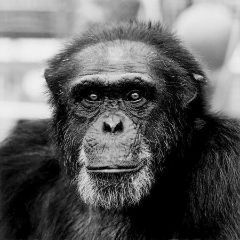BILLY JO

1969–2006
Meeting Billy Jo for the very first time, I was struck by his vulnerability and his strength…a total contradiction, and that was Billy’s legacy. There were people that loved Billy or feared him, he was two personalities wrapped in one bundle…I had nicknamed him “Bear,” for his ferocious days, and for his warm and loving days, a name that suited him so well.
Billy Jo’s story is deeply tragic, centered on loss, confusion, depression and aggression. Billy Jo came from a complicated background including the circus, cross-fostering, medical research and finally, sanctuary.
All chimpanzees raised for the sole purpose of entertaining are treated, dressed and fed like humans. It is little wonder they begin to act like humans. They never learn chimpanzee behaviors, and when they do use them, they are punished or discouraged from doing so. They are freakish really, unable to communicate properly to anyone but most of all to their own kind. This eventually causes these chimpanzees great anxiety and horrible consequences.
On September 8, 1983 Robert Heath sold Billy Jo and his companion Sue Ellen to New York University’s Medical Center, The Laboratory for Medicine and Surgery in Primates (LEMSIP). They were 15 years old and he could not afford to keep them any longer. They walked hand in hand right into their cages, never suspecting it would be the last time they were free.
“The sad truth is that most evil is done by people who never make up their minds to be either good or evil.” –Hannah Arendt
So often in sanctuary environments the hardest chimpanzees to help are those who have come from these backgrounds; the outcasts that are not accepted or understood. They suffer greatly in almost all environments, unable to make a place for themselves. Occasionally, they will get along with a small select group of chimpanzees that have adapted to their differences.
Billy Jo suffered. He was depressed, his head often hanging down on his chest in sadness. He is not unlike others from similar backgrounds. The victims of the entertainment world suffer deeply and it is an industry that needs to change. We keep these horrible entities alive by supporting the movies, the commercials, the products and the events where chimpanzees are put to work. It is not always visible to us and it is only years later that we learn how truly damaging this lifestyle is for chimps. The suffering is real.
Billy Jo spent the first 15 years of his life living as a human child. He was taken on outings, went fishing with the guys, went to the ice cream parlor and wore clothes and baseball caps. He was just like a child…except he also had his teeth knocked out.
The next chapter of Billy Jo’s life would begin with him walking into a cage where he would spend the next 15 years of his life. Everything changed! The very same species that he grew to love and trust and rely on would now torture him, shoot darts at him, inject him and hurt him…day, after day, after day.
Billy Jo would become a research subject, invaded and probed regularly. He was then infected with the HIV virus, the cruelest of diseases. His fate would be isolation and he was separated from those he considered his own: the humans. Once a chimpanzee is infected with the HIV virus and expected to die, they must be kept from humans as much as possible for fear of transmission of the virus, or so they thought in the beginning of these studies.
All chimpanzees that were infected were kept isolated in small closed units with no daylight or fresh air. They lived in ridiculously small cages (5’x5’x7′) and the most inhumane living conditions. Billy Jo was 4’5″ tall and had an arm span of 6′, he weighed 190 pounds…he could barely move enough to get any form of exercise or even fully extend his arms. He would live in this tiny cage for 15 years. He was unable to reach out to a human friend, unable to see without bars obstructing his view, unable to find comfort in his world of steel, darkness and despair. He almost lost his mind.
Billy liked humans and expected a lot from them — friendship, support and help. What he got was not always what he wanted. There were a number of technicians and people working at LEMSIP who knew Billy. He was someone who attracted attention and made friends. Yet, as kind and agreeable as he sometimes was, he was also the complete opposite: angry, mean, violent, aggressive and non-cooperative. He did not trust anyone anymore, he had lost his faith in humans and he was deeply sad. His depression and the unpredictable way he approached his life made him very dangerous.
Billy Jo’s story is not unique. There are many chimpanzees out there in research facilities or in sanctuaries that have lived some of the same. These are angry, depressed and unpredictable chimpanzees, who are also kind, loving, and dependent. There is so much we try to do for these individuals but it is often so difficult to help them. Their personalities are so affected by their messed up lives. They are often unwanted or unappreciated in social groups as they can be menacing and incapable of secure friendships, always having to watch over their shoulder for fear someone decides they have had enough.
So often Billy would get close to another chimpanzee only to betray them and turn on them, which they would then do in kind. Chimpanzees expect loyalty and a certain amount of social etiquette. They expect forgiveness and apologies when an altercation has occurred and if they don’t get it, the fight continues. Billy was incapable of responding appropriately and therefore ended up choosing a life of solitude and we had to help make that possible for him. He was unable to live in a social group for any length of time and when he did, he was almost always in a fight. He chose to close the doors of his rooms, to stay in alone and depend more on humans, leaving him once again in a complex world; a confusing world that he wasn’t meant to live in.
Billy, and so many others like him, suffered greatly. We could never give him what he needed and his losses in life were so unnecessary. His purpose in research was never validated. He was part of a study that gave inconclusive results and information and his years behind bars and all of his suffering was for nothing.
When I see any chimpanzee on television or on a greeting card or in the hands of trainers who say they are protecting the species, I think of dear Billy and his loss and suffering. I will never forget this special fellow or the others out there just like him. Those young actors or pets…they too will end up like Billy, alone in their worlds, stuck between human and chimpanzee, forever not fitting and always lost.
Remember Billy and help make sure we don’t repeat these mistakes. We owe that to him and to others like him. We really can, and must, do something about this.





